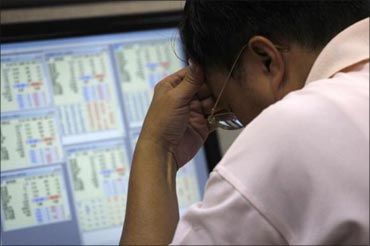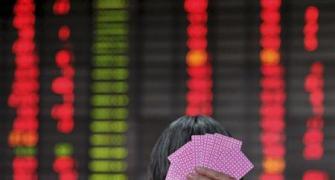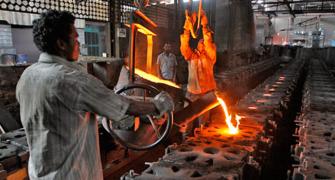
Index is down 17% from peak touched in January last year; all but three Sensex stocks down in one year
After one of the worst starts to a calendar year, the Indian markets are just 3 per cent off ‘bear market’ territory.
The benchmark Sensex is down 17 per cent, or 5,000 points, from its all-time closing high of 29,682 touched on January 29, 2015.
A correction of 20 per cent or more in a benchmark index is considered to be a start of ‘bear market’ phase.
The broad-based Nifty too is off over 16 per cent, or nearly 1,500 points from a record high of 8,996 on March 3.
Experts are divided whether the domestic markets will indeed slip into bear territory or will manage to rebound to keep the bull run intact.
“It remains to be seen if this will be a correction in the on-going bull market.
"Or the markets will slip into ‘bear market’ zone,” said Sandip Sabharwal, independent market analyst and former mutual fund manager.
“We have seen correction of 13-20 per cent in previous bull runs like 2003. If the ‘bull market’ is to remain intact, the correction phase is near its end,” he added.
The Indian market had been on an upward trajectory since August 2013.
The benchmark Sensex and Nifty indices gained nearly 70 per cent between August 2013 and March 2015.
The broad-based Mid -- and Small-cap indices had gained even more during this period, led by robust foreign and domestic flows and across the board buying by investors.
The domestic stocks, however, have traded weak since August on concerns surrounding China-led global slowdown.
“Global factors have been responsible for the ongoing correction.
"With oil and other commodity prices correcting, global deflation has become a real threat,” said G Chokkalingam, founder of Equinomics Research & Advisory.
“If the global deflationary pressures continue, it will be bad news for the markets.
"If oil prices fall further, a lot of countries will see negative inflation and interest rates. It starts a vicious cycle and India too will be impacted badly.”
Sabharwal said it is difficult to imagine India slipping into ‘bear market’ phase given its economic growth and monetary policy easing.
“Typically, we have seen markets entering bear phase when the funds rate in the US are three per cent.
"We are currently at 2.5 per cent.”
Chokkalingam said markets might bounce back as global central banks will take steps such as stimulus packages to stave off deflationary pressures.
Growth concerns have seen global oil and commodity prices crash, causing a cascading impact on stock prices of companies operating in the resource sector.
Among Sensex components, apart from just three stocks, all have seen their share prices slip from January 2015 levels, when the market was at a record high. Shares of Vedanta for instance have come off 60 per cent since January last year.
BHEL, Hindalco and Tata Motors are the other major losers with their share prices coming off over 40 per cent.
Banking names like SBI and ICICI Bank too have seen a near-40 per cent drop and have been among the major contributors to the Sensex decline.
Meanwhile, Reliance Industries and Maruti Suzuki have been the only two stocks that have managed to generate relatively better returns in the last one year, despite a sharp fall in the markets.
This file photograph shows a trader reacting over fall in the stock market. Photograph: Reuters









.jpg)
